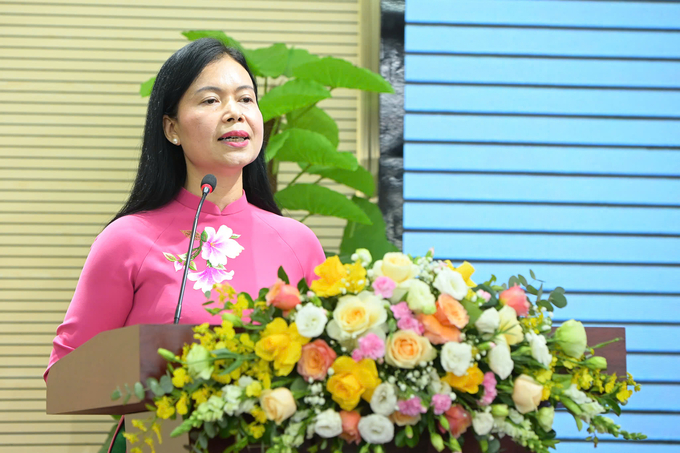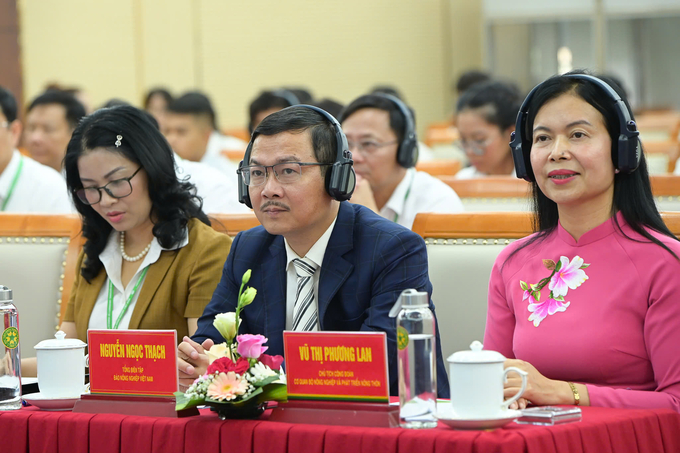November 26, 2025 | 05:13 GMT +7
November 26, 2025 | 05:13 GMT +7
Hotline: 0913.378.918
November 26, 2025 | 05:13 GMT +7
Hotline: 0913.378.918

Ms. Vu Thi Phuong Lan, the Chairwoman of MARD's Trade Union speaking at the event. Photo: Tung Dinh.
The U.S. Department of Agriculture and the U.S. Mission to ASEAN have partnered with agencies under the Vietnamese Ministry of Agriculture and Rural Development to coordinate the International Year of the Woman Farmer – ASEAN Roadshow in Vietnam on August 12.
Ms. Vu Thi Phuong Lan, the Chairwoman of MARD's Trade Union, stated, "This is a valuable opportunity for us to reflect on the accomplishments we have achieved and to engage in discussions regarding potential solutions to further advance the status of women in agriculture."
Vietnamese women have been instrumental in the development of agriculture and rural infrastructure. They have made a substantial contribution to the country's socio-economic development through their creativity and resilience. Nevertheless, women encounter numerous obstacles and impediments during this process, including challenges related to gender equality, as well as barriers to accessing resources and development opportunities.
Currently, approximately 80% of women are engaged in agricultural production in rural locations. Approximately 25% of the women in this group are involved in the management of agricultural cooperatives. It is important to note that the percentage of women in cooperatives who hold leadership and management positions is even higher in challenging regions.
The program is a resounding endorsement of our dedication to advancing the role and status of women in agriculture, in response to the "International Year of Woman Farmers 2026" initiative in Vietnam. It is also a platform for us to exchange experiences, learn from one another, and collaborate to create a sustainable future in which women can completely realize their potential.
The Vietnam National University of Agriculture is the site of the event, a facility that is dedicated to the cultivation and advancement of talents, particularly female students, scientists, and specialists who have made substantial contributions to the advancement of our nation's agriculture.
In order to improve the status of women in agriculture, government agencies, international organizations, and local communities must collaborate closely. It is imperative to establish policies that facilitate the access of rural women to capital, technology, and markets. Simultaneously, it is imperative to implement initiatives that enhance training and awareness regarding gender equality to ensure that all women have the chance to contribute to the overall development.
"Finally, I would like to confirm that the Ministry of Agriculture and Rural Development of Vietnam, in collaboration with the Ministry's Trade Union, will persist in their efforts to provide support to female farmers as they progress and develop." She declared, "We are dedicated to maintaining our support and establishing the most conducive environment for women to fully realize their potential in agriculture."
The gender disparity in food insecurity risk has increased from 1.7% in 2019 to 4.3% in 2021, according to data from the Food and Agriculture Organization (FAO). During the Covid-19 pandemic, 22% of female workers in the agricultural and food industry were laid off, while 2% of males experienced the same fate. Additionally, the disparity in income between men and women persists across all sectors. In the agricultural sector, women earn only 82 cents for every dollar that a male earns.
Vietnam is not significantly distinct from the global situation. Our country is ranked 72nd out of 146 countries in terms of gender equality progress, according to the Global Gender Gap Report 2023.
In Vietnam's agricultural sector, the majority of women engage in informal labor, which is not subject to legal regulations for women. Many female employees are not eligible for maternity benefits, pensions, or credit incentives, and their land assets are frequently held in the names of their spouses.
The food supply chain has been partially disrupted as a result of the exclusion of women while other aspects are being developed. To be more precise, women are faced with restricted opportunities and encounter challenges in obtaining machinery (some are compelled to employ males for technical operations). In general, the majority of women are deficient in the skills and knowledge required to manage their tasks. To a greater extent, the aforementioned figures are the consequence of antiquated gender norms that restrict women's access to productive resources.
Therefore, in order to innovate agriculture, it is imperative to provide female laborers with the requisite knowledge to make informed decisions, thereby facilitating the transformation of rice value chains. The promotion of social progress is a consequence of investing in gender equality in agriculture.
Many female farmers have reported that their lives have been substantially enhanced by the use of appropriate machinery. "It is unnecessary to immerse our hands and feet in chemical water on a daily basis." Previously, our skin would be completely consumed, rendering us unable to feed with our hands or perform any other activities. Currently, technologies assist us in reducing the number of hours spent on the fields. A female farmer confides, "We can better care for our families and ourselves."
Conversely, it is imperative to resolve the gender disparity within the agricultural value chain. Management levels must prioritize gender equality, as 90% of men hold decision-making authority and receive agricultural extension training. Equitable access to information and technology is essential for both men and women.
Everyone has the ability to solve problems, make proactive decisions, and contribute to agricultural innovation as a result of the equal distribution of knowledge. A comprehensive and sustainable future for the food production industry will be guaranteed by this course of action.

Delegates from MARD, VNUA and Vietnam Agriculture Newspaper join in the forum. Photo: Tung Dinh.
Policies must be implemented by the government to ensure that women are able to capitalize on their opportunities. For instance, it is necessary to review and revise policies regarding maternity benefits for women employed in agricultural sectors, salary or pension, and land assets, regardless of the husband's status.
Women have been acknowledged as agents of change who actively contribute to the socio-economic development of the agricultural sector. In the Mekong Delta region and Vietnam, certain initiatives prioritize gender roles, including the "Establishment of a sustainable rice value chain for smallholders in the Mekong Delta" and the "Food loss in the catfish value chain in the Mekong River basin" projects.

(VAN) Deputy Minister Nguyen Quoc Tri emphasized the determination to prevent violations at CoP20, sharing enforcement results and commitments to strengthen cooperation with the international community in the coming period.

(VAN) In addition to strengthening the relationship between schools and enterprises, the Aus4Skills project expands opportunities for female students and people with disabilities to work in the transport and logistics sector.

(VAN) Nghe An is preparing policy, technical, and resource steps to participate in the forest carbon credit market.
/2025/11/25/1648-2-110733_532.jpg)
(VAN) From 2011 to 2023, Ca Mau province lost approximately 6,200 ha of coastal land and protection forests due to erosion, threatening many residential areas, infrastructure facilities, and production zones.

(VAN) Quang Ngai holds strong potential for carbon credits but needs a clear legal and policy framework to secure sustainable revenue from this resource.

(VAN) With its diverse ecosystem, Phu Quoc National Park plays a vital role in environmental protection and biodiversity conservation and serves as the core zone of the Kien Giang World Biosphere Reserve.

(VAN) Cooperation activities under the Aus4Skills program focus on: logistics professional development, competency-based training and assessment (CBTA), leadership innovation, and digitalization.